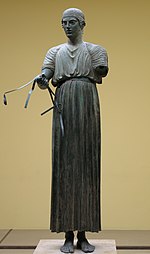Pausanias (geographer)
Pausanias (Greek: Παυσανίας) was a Greek traveller and geographer of the 2nd century A.D., who lived in the times of Hadrian, Antoninus Pius and Marcus Aurelius. He is famous for his Description of Greece (Ἑλλάδος περιήγησις), a lengthy work that describes ancient Greece from firsthand observations. He is a crucial link between classical literature and modern archaeology.
Biography
Pausanias was probably a native of Lydia; he was certainly familiar with the western coast of Asia Minor, but his travels extended far beyond the limits of Ionia. Before visiting Greece he had been to Antioch, Joppa and Jerusalem, and to the banks of the River Jordan. In Egypt he had seen the Pyramids, while at the temple of Ammon he had been shown the hymn once sent to that shrine by Pindar. In Macedonia he had almost certainly viewed the traditional tomb of Orpheus. Crossing over to Italy, he had seen something of the cities of Campania and of the wonders of Rome. He was one of the first to write of seeing the ruins of Troy, Alexandria Troas, and Mycenae.
Work
Pausanias' Description of Greece takes the form of a tour in Ionia on the coast of Asia Minor and in the Peloponnese and part of northern Greece. He constantly describes ceremonial rites or superstitious customs. He frequently introduces narratives from the domain of history and of legend and folklore, and it is only rarely that he allows the reader to see something of the scenery.
References
Other websites
- Description of Greece, tr. W.H.S. Jones and H.A. Ormerod (1918)
- Description of Greece, Jones translation at Theoi Project
- Bibliography (in French) Archived 2006-11-26 at the Wayback Machine
Further reading
- Hutton, William 2005, Describing Greece: Landscape and Literature in the Periegesis of Pausanias (Cambridge). ISBN 0-521-84720-6.
- Levi, Peter (tr.) 1984a, 1984b, Pausanias: Guide to Greece, 2 vols. (Penguin). Vol. 1 Central Greece ISBN 0-14-044225-1; vol. 2 Southern Greece ISBN 0-14-044226-X.
- Pretzler, Maria. "Turning Travel into Text: Pausanias at work", Greece & Rome, Vol. 51, Issue 2 (2004), pp. 199–216.
| This article includes text from the public domain 1911 Encyclopaedia Britannica. Please add to the article as needed. |
